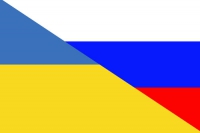
What is the difference between Russian and Ukrainian?
Many Russian and Ukrainian words have common roots, that is why the languages seem similar. But it is not so. In fact, they have more differences than things in common. As is well known, both Russian and Ukrainian belong to East Slavic languages. They have common alphabet, similar grammar and significant lexical uniformity. However, certain peculiarities in cultural development of these peoples caused marked differences in their languages.
Firstly, there are differences in the alphabets.
The Ukrainian alphabet which was formed at the end of the 19th century does not contain such letters as Ёё, Ыы, Ъъ as distinct from Russian, but it has the letters Ґґ, Єє, Її which the Russian language lacks. Besides, some letters are pronounced differently in Russian and Ukrainian. Thus, “Ї” existing only in Ukrainian sounds like “ЙИ”, “Ч” sounds harder similar to Byelorussian or Polish, while “Г” is a deep-throat fricative sound.
Are they close languages?
Modern research has shown that Ukrainian is more similar to other
Slavic languages: to Belorussian (29 common features), Czech and
Slovak (23), Polish (22), Croatian and Bulgarian (21), but as to
Russian there are only 11 common features.
Proceeding from this, some linguists even question the unification of
Russian and Ukrainian into one language group.
According to statistics, only 62% words are common in these languages.
These characteristics rank Russian fifth after Polish, Czech, Slovak
and Byelorussian. For example, English and Dutch are 63% similar as to
their lexical composition, which is more than Russian and Ukrainian.
The ways have diverged
The differences in Russian and Ukrainian are based on the differences
in the nation formation. The Russian nation was formed around Moscow
as its center, which brought a lot of Finno-Ugric and Turkic words
into the language. The Ukrainian nation took shape due to uniting
several South Russian ethnic groups, thus the Ukrainian language has
preserved the Old Russian basis.
By the middle of the 16th century Russian and Ukrainian had already
differed substantially but if the texts written in Old Ukrainian are
understandable on the whole to the present-day Ukrainians, the
documents of the epoch of Ivan the Terrible can hardly be understood
by Russians without “translation”.
Even more visible discrepancies appeared when the literary Russian
language started developing in the early 18th century. The great
number of Church Slavic words in the new Russian language made it
poorly understandable for Ukrainians.
Late in the 18th century the literary Ukrainian language started
developing and getting rid of its connections with Russian as
Ukrainians were more in the mainstream of European processes than
Russians. In particular Ukrainian got rid of Church Slavic words
replacing them with folk and loan words from Eastern European
languages.
An important feature of Ukrainian is its dialectic diversity because
different parts of Ukraine belonged to different states:
Austria-Hungary, Rumania, Poland, Czechia. Thus, the language of
people in Ivano-Frankovsk is not easily understood by the people in
Kiev, while the inhabitants of Moscow and Siberia speak the same
language.
Difference of meanings
Despite the fact that there are many common words and a lot of words similar in sound and writing, they may differ in meaning or its shades. For example, both languages have the word “zhal” but in Russian it corresponds to the English “pity” and is a predicative adverb, while in Ukrainian it can be both an adverb (and in this case it has the same meaning as in Russian) and a noun meaning “grief”, “sorrow”, “pain”. The Russian word lacks this meaning.
Western-style
It is not uncommon for language students to say that Ukrainian is
closer to western languages than Russian. Professional translators
admit that translation from English into Ukrainian is easier than into
Russian. This is due to certain grammatical constructions. For
example, Ukrainian verbs “to be” and “to have” are sometimes
interchangeable, which is not true for Russian. Besides, Ukrainian
“have” can also mean “must” like in English, while in Russian it
cannot. Another example is the verb “to wait”: in Russian it is
transitive, while in Ukrainian it is intransitive and requires a
preposition like in English.
On the contrary, Russian has some loan words which are not inherent in
Ukrainian. For example, the names of months in Russian are loan
translations from Latin, while Ukrainian preserved Slavic words.




